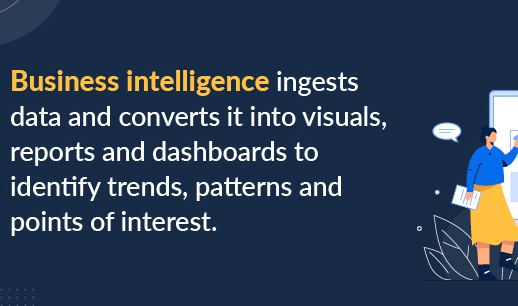In today’s fast-paced and data-driven world, businesses face a pressing need to make informed decisions quickly. This demand for actionable insights has led to the rise of Business Intelligence (BI), a powerful tool that empowers organizations to harness the potential of data to drive growth, boost efficiency, and gain a competitive edge.
In this comprehensive article, we’ll delve deep into the world of business intelligence, exploring its concepts, working principles, and real-world applications. From understanding the fundamental question, “What is Business Intelligence?” to exploring advanced BI tools and techniques, we’ll equip you with valuable insights to unlock the full potential of data-driven decision-making.
What Is Business Intelligence?

At its core, Business Intelligence refers to the process of collecting, analyzing, and transforming raw data into meaningful insights to drive strategic decision-making. By leveraging BI tools and technologies, businesses can gain a comprehensive understanding of their operations, customers, market trends, and competitors.
Business Intelligence helps organizations uncover patterns, identify opportunities, and predict future trends. It empowers stakeholders at all levels to make data-backed decisions that optimize processes, boost productivity, and maximize revenue.
The Evolution of Business Intelligence
In this section, we’ll take a journey through the evolution of Business Intelligenc and how it has transformed over the years.
The Early Days: Manual Reporting and Data Analysis
In the early days, BI was a manual process that involved gathering data from various sources, creating reports, and manually analyzing them. This approach was time-consuming, prone to errors, and limited in scope.
Emergence of Data Warehousing
With the advent of data warehousing in the 1980s, BI took a significant leap forward. Data warehouses provided a centralized repository for data, making it easier to access and analyze information. This innovation laid the foundation for modern BI systems.
The Era of Self-Service BI
In the 21st century, self-service BI tools emerged, empowering non-technical users to explore data and generate insights independently. This democratization of data marked a pivotal shift in the BI landscape, allowing businesses to foster a data-driven culture.
The Rise of Advanced Analytics
Today, we witness the rise of advanced analytics, powered by machine learning and artificial intelligence. These cutting-edge technologies enable businesses to perform predictive and prescriptive analytics, unlocking deeper insights and driving more accurate decision-making.
Why Business Intelligence Matters
Business Intelligence holds immense significance for modern organizations. Let’s explore why BI is a game-changer in today’s competitive landscape.
Data-Driven Decision-Making
BI enables data-driven decision-making, allowing businesses to move away from gut-feel decisions and base choices on empirical evidence. This data-centric approach minimizes risks and enhances success rates.
Improved Operational Efficiency
By analyzing various operational metrics, BI helps identify bottlenecks and inefficiencies in processes. Organizations can streamline workflows and allocate resources effectively, resulting in improved efficiency.
Enhanced Customer Understanding
BI tools provide valuable customer insights, such as preferences, behavior, and buying patterns. This knowledge helps businesses tailor their products and services to meet customer needs effectively.
Competitive Advantage
In a fiercely competitive market, BI provides a competitive advantage by uncovering unique opportunities and emerging trends. This strategic foresight allows organizations to stay ahead of the curve.
Real-Time Monitoring
With BI dashboards and real-time reporting, businesses can monitor performance metrics in real-time. This enables prompt action and timely responses to changing market conditions.
LSI Keyword-Focused Table of Contents
| Heading | Subheading(s) |
|---|---|
| What Is Business Intelligence? | Definition and Overview |
| The Evolution of Business Intelligence | – The Early Days: Manual Reporting and Data Analysis |
| – Emergence of Data Warehousing | |
| – The Era of Self-Service BI | |
| – The Rise of Advanced Analytics | |
| Why Business Intelligence Matters | – Data-Driven Decision-Making |
| – Improved Operational Efficiency | |
| – Enhanced Customer Understanding | |
| – Competitive Advantage | |
| – Real-Time Monitoring | |
| The Role of BI in Modern Businesses | – Strategic Decision-Making |
| – Market Analysis and Competitor Research | |
| – Customer Relationship Management | |
| – Supply Chain Optimization | |
| – Human Resources Management | |
| Key Components of Business Intelligence | – Data Sources and Integration |
| – Data Warehousing and ETL | |
| – Data Visualization and Reporting | |
| – OLAP and Data Mining | |
| – AI and Machine Learning | |
| How BI Tools Revolutionize Organizations | – Self-Service BI |
| – Interactive Dashboards and Reports | |
| – Predictive and Prescriptive Analytics | |
| – Natural Language Processing | |
| Challenges in Implementing BI Solutions | – Data Quality and Governance |
| – Integration and Interoperability | |
| – User Adoption and Training | |
| – Cost and Resource Management | |
| Future Trends in Business Intelligence | – Embedded BI |
| – Mobile BI | |
| – Big Data and BI | |
| – Ethics and Privacy in BI | |
| – AI-Driven BI |
FAQs
What Are the Key Benefits of Business Intelligence?
Business Intelligenc offers several benefits, including data-driven decision-making, improved operational efficiency, enhanced customer understanding, competitive advantage, and real-time monitoring.
How Does Business Intelligence Improve Decision-Making?
By providing valuable insights and trends, BI enables businesses to make informed decisions based on data, rather than intuition or guesswork.
What Are Some Popular Business Intelligence Tools?
Some popular BI tools include Tableau, Power BI, QlikView, Domo, and MicroStrategy, each offering unique features for data visualization and analysis.
Can Small Businesses Benefit from Business Intelligence?
Absolutely! BI tools come in various sizes and can be tailored to meet the needs of small businesses. Embracing BI helps small enterprises remain competitive and agile.
How Does Artificial Intelligence Impact Business Intelligence?
Artificial Intelligence enhances BI by enabling advanced analytics, predictive modeling, natural language processing, and automation of repetitive tasks.
Is Business Intelligence Only for Large Corporations?
No, BI is applicable to businesses of all sizes. Small and medium-sized enterprises can leverage BI to optimize operations and foster growth.
Conclusion
In conclusion, Business Intelligenc has emerged as an indispensable asset for businesses seeking to thrive in a data-centric world. By understanding “What Is Business Intelligenc” and its manifold benefits, organizations can leverage data insights to make smarter decisions, identify growth opportunities, and gain a competitive edge.
Embracing BI tools and technologies empowers businesses to stay ahead of the curve and drive innovation. So, take the plunge into the world of Business Intelligenc and unlock the power of data-driven success.


